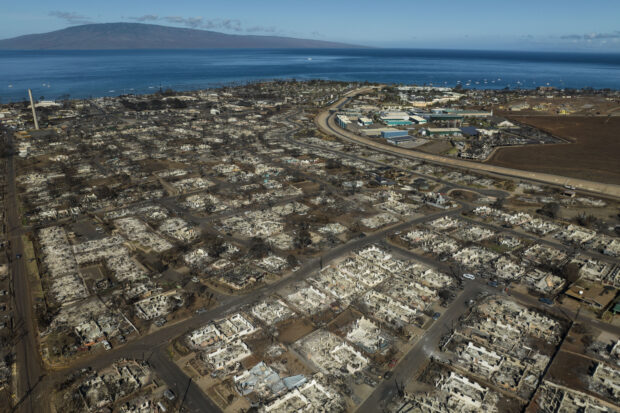A judge on Friday forced the Hawaii attorney general’s office to turn over to lawyers involved in the hundreds of lawsuits over last summer’s Maui wildfires all documents, interviews and data collected by the outside team hired to investigate the disaster.
Attorneys representing plaintiffs suing over the August fires filed a motion last month asking a judge to compel the state provide them with the material gathered by the Fire Safety Research Institute, which was hired by the state to investigate.
The state refused, saying disclosing the records would “jeopardize and hinder” the investigation. In court documents opposing the motion, the state called the request “premature, baseless and frivolous,” and asked a judge to order that attorneys fees be paid to the state for defending against the motion.
Soon after the deadliest U.S. wildfire in more than a century ripped through the historic town of Lahaina and killed 101 people, Hawaii Attorney General Anne Lopez announced hiring outside investigators. Last month Lopez and representatives from the Fire Safety Research Institute released a report on the first phase of the investigation, which said the head of the emergency management agency dragged his heels about returning to the island amid the unfolding crisis, while a broad communications breakdown left authorities in the dark and residents without emergency alerts.
During a Friday hearing on the island of Maui, state Deputy Attorney General David Matsumiya told Judge Peter Cahill the state is concerned that releasing information could prompt the six people who haven’t been interviewed yet to change their stories.
Cahill balked.
“Do you really believe that’s going to be happening?” he asked, clearly upset. “And so what if they change their stories? Aren’t they entitled to?”
Cahill seemed to indicate concerns with the investigation, including whether people interviewed were advised that they weren’t obligated to answer questions.
“By the way, the taxpayers are paying for this,” the judge continued.
Lopez said last month the investigation contract was initially not to exceed $1.5 million, but because they are behind schedule, the contract was extended. According to an updated contract, the cost increased by $2.5 million, not to exceed a total of $4 million.
The judge’s order is of “grave concern,” the attorney general’s office said in a statement after the hearing.
“The independent, objective fact-finding process and analysis is critical to determining what county and state agencies must do to ensure that a tragedy like this never happens again,” the statement said. “Premature release of these materials may allow external factors to influence the analysis.”
The attorney general is reviewing options and will soon decide on an appropriate course of action.
Cahill told Matsumiya he understands the state’s concerns, but not giving the information to the attorneys would delay litigation. The investigation is important, and it was a wise investment to hire an outside agency given the state lacks a fire marshal, he said, “but it’s also important that people have their day in court.”
Cahill noted there are some 400 lawsuits involving thousands of plaintiffs.
“It’s frustrating the process of litigation,” Cahill said, “which is also a truth-seeking mechanism.”
David Minkin, an attorney representing Maui County, suggested to the judge that the investigative process was tainted.
Investigators “showed up in Lahaina, said we’re here from the AG’s office and started talking to people,” without informing them of their rights, he said.
Matsumiya said the state is trying to “protect the integrity of the investigation, which is designed to create a better future for Lahaina, and all of those people in Lahaina.”
But Cahill responded that “the past in this case, given what’s occurred on this island, needs to be taken care of as well,” and that litigation will determine whether there were any legal breaches of duty.
During a separate hearing later Friday to discuss coordination of the lawsuits, Cahill said a handful of lawsuits are scheduled to go to trial in November.





















 AIG, Chubb Can’t Use ‘Bump-Up’ Provision in D&O Policy to Avoid Coverage
AIG, Chubb Can’t Use ‘Bump-Up’ Provision in D&O Policy to Avoid Coverage  Chubb CEO Greenberg on Personal Insurance Affordability and Data Centers
Chubb CEO Greenberg on Personal Insurance Affordability and Data Centers  20,000 AI Users at Travelers Prep for Innovation 2.0; Claims Call Centers Cut
20,000 AI Users at Travelers Prep for Innovation 2.0; Claims Call Centers Cut  Beazley Agrees to Zurich’s Sweetened £8 Billion Takeover Bid
Beazley Agrees to Zurich’s Sweetened £8 Billion Takeover Bid 